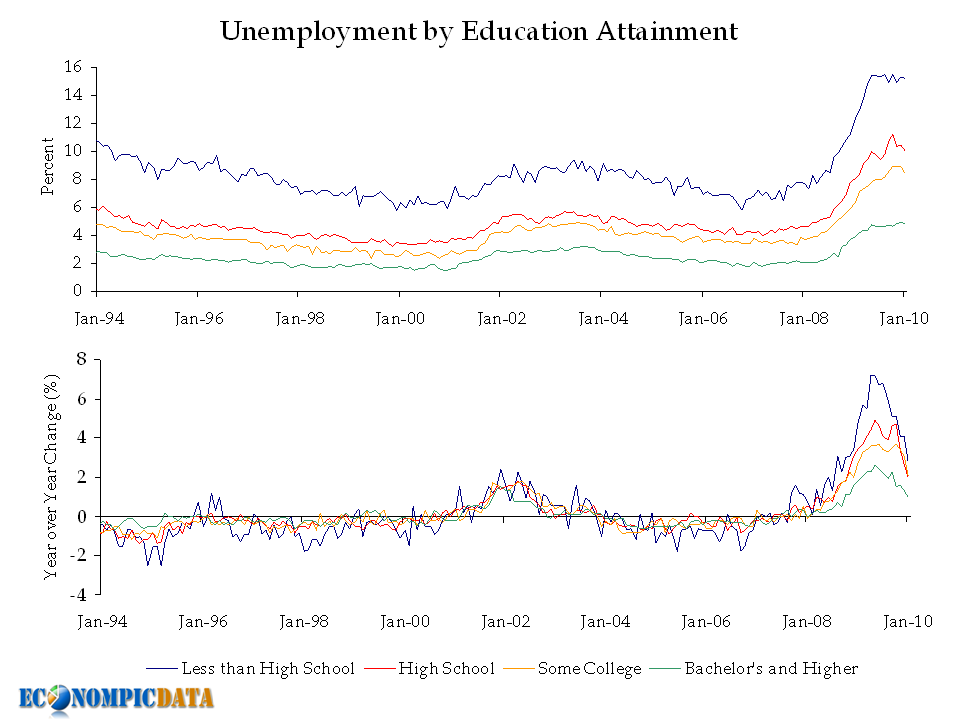Education and Employment
The BLS has compiled some data showing, not surprisingly, that unemployment is negatively correlated with educational attainment. Here‘s a nifty graph:
Matt Yglesias suggests, “[I]f someone you know is considering dropping out of high school, you ought to do everything possible to convince him or her to reconsider. Even in non-recession times, the labor market outlook for people who don’t finish high school is very bad.”
Now, I don’t happen to know anyone thinking about dropping out of high school (or, for that matter, all that many people in high school — I’m 44, after all) but I would certainly advise them against it. But the data are at least somewhat skewed. The fact of the matter is that, for two generations or more, it’s simply expected that people graduate high school and strongly encouraged that people go on to college. So, the type of person who drops out of high school is likely the type of person who’s going to have a hell of a time holding a job because of personality factors.

Matt’s advise presumes that the listener has a realistic choice about whether to go to college. If we discount students who have below-average high school grades, poor self-motivation, or substantial child-rearing responsibilities, the correlation may disappear. IOW, put yourself in a position to have a choice about going to college.
I sometimes think the idea that college is for everyone is an idea we need to move away from. The reality is that college is not for everyone.
I think people who really want to go to college should be able to go, but I am not sure every person needs to attend high school until they are 18. I wonder if some populations wouldn’t be better served by ending high school at 16 and letting them go into some kind of training for a trade.
But even then there are always going to be some students who aren’t going to make it even in the trades, but at the very least they don’t have to feel like they have failed or that they must pass three years of a foreign language and learn calculus.
The graph also hides the fact that HR departments frequently demand higher credentialing than necessary. Lots of people are blocked from employment because HR believes a BS or MS is required. In my experiences, it often is not.
I tend to agree with just me but with some clarifications. In this day and age what is considered a trade? There are positions in basic construction trades which can be learned with OJT. But in my opinion there are many modern “trades” which require training/instruction and a basic ability to learn on the part of the trainee. I’m thinking of paramedics, CNAs, electronics, communications and med techs, etc. They all need a solid grounding in basic math, a little algebra and reading/writing skills. I would like to see a secondary vocational prep program which does not carry the stigma of failure because the kid doesn’t want to attend a college or university.
Additionally, neither the graphs nor the underlying data distinguish between those with college educations and those with professional certifications. If, for example, the unemployment rate is very, very low among professionals it could conceivably be skewing the entire category.
It’s an important distinction since it would help us distinguish whether greater education or greater ability to limit entry is the determining factor.
“It’s an important distinction since it would help us distinguish whether greater education or greater ability to limit entry is the determining factor.”
Gawd. Still flogging the evil cabal behind the curtain?
Dave, I wouldn’t limit the analysis to professionals, but government employees in general. For example, police officers increasingly are required to have a college degree and law enforcement tends to be one of the most difficult parts of government to cut.